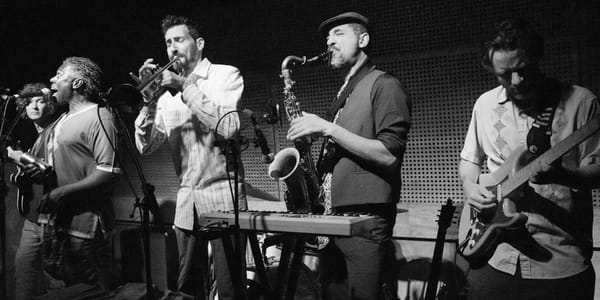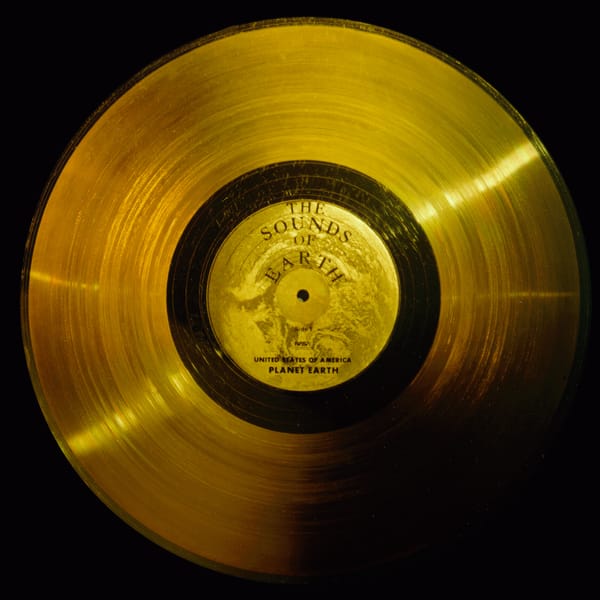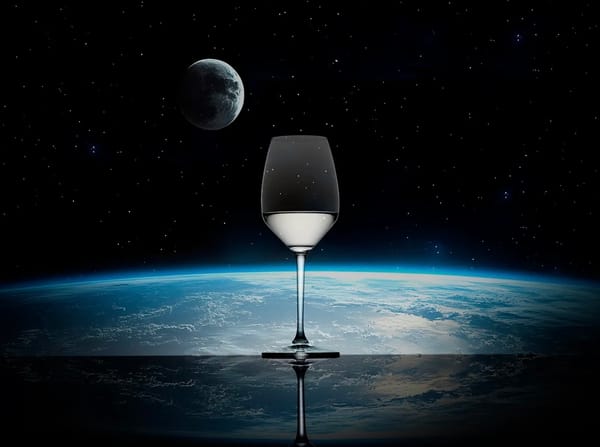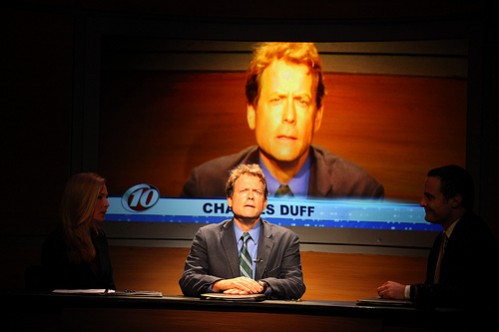
Jennifer Westfeldt and Dominic Fumasa watching Greg Kinnear. The Power of Duff The first thing that came to mind after having read advance word about The Power of Duff, a new play by Stephen Belber (at Vassar's Powerhouse Theatre) about a local news anchor who “has a spiritual awakening on television” was: What could it possibly add to the subject after Network; the current HBO show The Newsroom; and The Mary Tyler Moore Show--even Anchorman for that matter -- not to mention pre-television but similar mass media-focused masterworks such as The Front Page, His Girl Friday, and Citizen Kane? The newspaper or television news comedy/drama has been a well-established subgenre for nearly a century now and many artists have gotten it especially right over that time. The twist in Duff turns out to be that the lead character is not going though anything as dramatic as a flailing nervous breakdown (a la Peter Finch in Network), or finally taking himself seriously as a journalist (Jeff Daniels in The Newsroom), or Mary Richard's struggle for independence and happiness in a man’s world (in you know what). He’s just having a wee midlife crisis that leads to a serious thought expressed in an improvised moment: a nonsectarian “prayer” for a recently deceased family member (his father). It’s a brief personal expression that’s completely sane and well within the bounds of normalcy, even for live TV. But contrasted with the synthetic cheer and trivial, corporate-controlled content of local broadcasts (live from Rochester, New York in this case), Duff’s prayer sends everyone in the news room, and in the town in general, into a tizzy. According to Duff, the aftermath of the world that Network predicted is not an apocalypse but how much havoc an expression of warm-hearted positive thinking can wreak on people these days. The satire still is what counts in this genre, and Duff does it very well, particularly in the performances of Dominic Fumusa as a high-volume co-anchor and Neal Huff, in a variety of roles, on air and off. The mildness of the character’s “madness,” however, turns out be even more difficult to make entertaining comedy with. Of enormous help is the heart-rending, almost Keatonesque performance of Greg Kinnear as Duff, whose handsome hangdog face manages to express multitudes. He’s a star and brings a constant excitement to the stage, even while barely moving a facial muscle. That’s what they say good film actors learn to do best; Kinnear is living proof of this truism –and must be seen. Though lucky to have Kinnear, the play could use some editing and a reconciling of the comedy with the earnest message, which essentially comes down to “all we need is more grace and consideration in the world today and the courage to express it.” But having seen Duff only hours after hearing of the tragic shooting in a Colorado cinema, I saw that its earnestness – even during its loungeurs -- had the audience in tears. Work still needs to be done on this tender, wise, and funny play, a potentially worthy successor and welcome addition to its forbears, but it’s definitely worth doing. The Power of Duff at Vassar College's Powerhouse Theater by Stephen Belber Directed by Peter Dubois Starring Greg Kinnear, Jennifer Westfeldt, and Dominic Fumasa Now - July 29
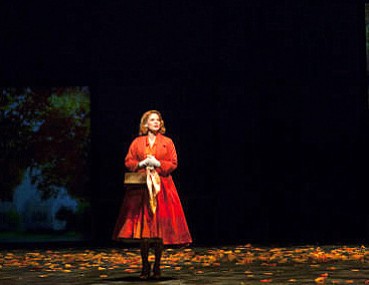
Kelli O'Hara sings the praises of "Autumn in Connecticut." Far From Heaven It’s amazing how tight and together Far From Heaven is, particularly considering the ambitious scope of this project, and that it's a "preview production" (at Williamstown Theatre Festival) on a long road that will lead it to Playwrights Horizons in New York City and beyond. And no wonder: the first-rate talents involved include director Michael Greif (Next to Normal), playwright Richard Greenberg (Take Me Out), plus composer Scott Frankel and lyricist Michael Korie, both of Grey Gardens fame. The musical is based on the Todd Haynes 2002 film of the same name (itself an hommage to Douglas Sirk's 1955 film All That Heaven Allows, among other Sirk films), about a 1950s housewife from Hartford, Connecticut facing the dissolution of her marriage due to her husband’s homosexuality– not exactly what you would call a hummable concept, but neither was Pacific Overtures for that matter. But what Far From Heaven manages to do is it to take the rather blank slate of Hayne’s schematically drawn characters and the Sirk-inspired plot and visuals (however updated the political sensibility) and give it a more jazzy, ironic, and theatrical treatment.
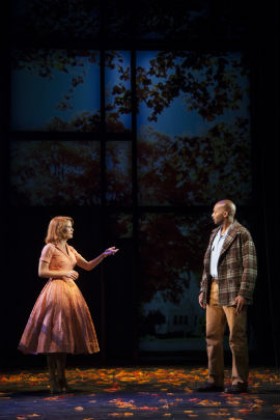
Frankel's music, which often has a catty percussive thrust to it (with autumnal coloristic tonalities always riding right behind), and Korie's conversational lyrics both make much better hay out of the narrow-minded world of the suburbs of the 1950s; fittingly, this musical has a more enjoyably camp attitude than the film (weighted down as it is by Haynes' stated not-so-magnificent obsession with Sirk). While the film seems to linger melodramatically, the show -- smartly, sparely designed by Allen Moyer -- moves along in a gabby, recitative operetta style. As a result, serious dramatic relationships, such as the one between the heroine (played and sung wonderfully by Kelli O’Hara) and her African-American gardener (the equally solid Brandon Victor Dixon at left in photo) become far more moving and genuine in contrast. A suggestion: the show’s creators could build on one of its most stirring songs, "The Only One," a warm duet sung by O’Hara and Dixon about always finding oneself alone in a prejudiced, unevolved world. (I thought of it as an update on the Depression-era Dietz and Schwartz standard "Alone Together," introduced in a Broadway musical called Flying Colors in 1932.) Since "alone together" is how so many of the characters in this tale end up, its descendant could easily be turned into the show’s most moving anthem. Far From Heaven at Williamstown Theatre FestivalMusic by Scott Frankel Lyrics by Michael Korie Book by Richard Greenberg Directed by Michael Greif Now - July 29


